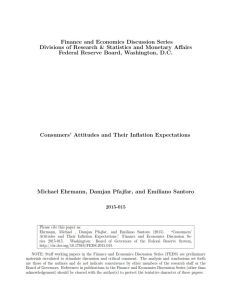Acesse a sua conta getAbstract para obter o resumo!

Acesse a sua conta getAbstract para obter o resumo!
Michael Ehrmann, Damjan Pfajfar and Emiliano Santoro
Consumers’ Attitudes and Their Inflation Expectations
Federal Reserve Board, 2015
Sobre o que é?
Demographics, personal finances and attitudes inform consumers’ expectations about inflation.
Recommendation
Because consumers constitute the backbone of the American economy, input from the man – and woman – on the street matters. And that is especially true of consumers’ outlooks on prices, which can influence inflation’s course and effect on the nation’s economy. Understanding the quirks of people’s inflationary expectations is a challenge that economists Michael Ehrmann, Damjan Pfajfar and Emiliano Santoro handily meet. They scour microdata to determine how well consumers understand the subject, what goes into their assessments and what that implies for policy makers. getAbstract recommends this dry but cogent study to government officials, economists and investors.
Summary
About the Authors
Michael Ehrmann is chief of economic and financial research at the Bank of Canada. Damjan Pfajfar is an economist with the Federal Reserve Board. Emiliano Santoro is an associate professor of economics at the University of Copenhagen.

















Comment on this summary